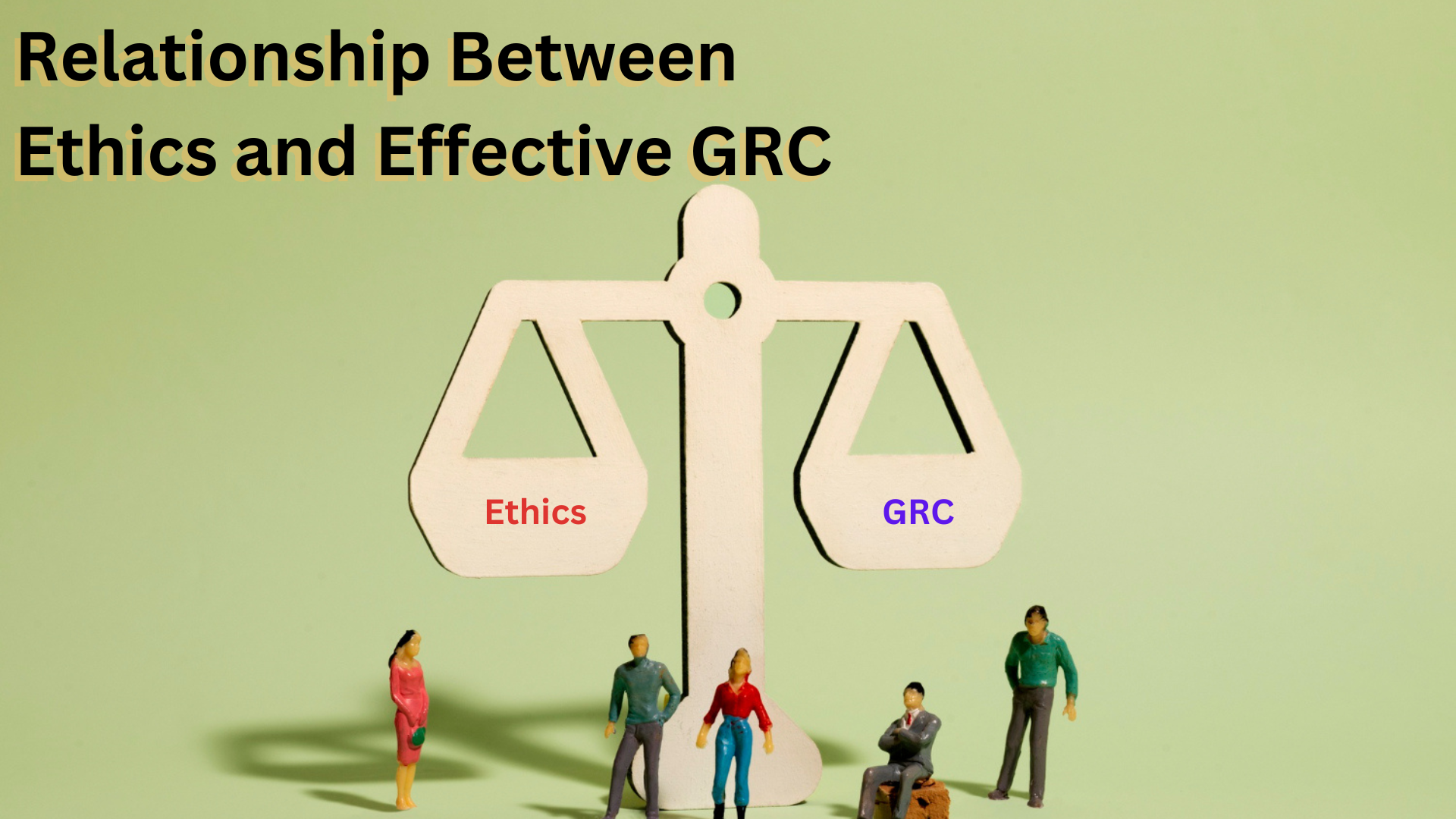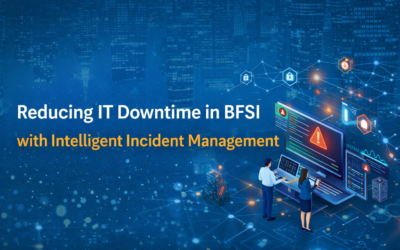Effective Governance, Risk Management, and Compliance (GRC) is essential for mitigating risks, ensuring regulatory compliance, and promoting sustainable business practices. However, an often overlooked yet critical component of effective GRC is ethics. This blog explores the intricate relationship between ethics and GRC, highlighting how ethical principles serve as the bedrock for effective governance, risk management, and compliance.
Understanding GRC
Governance refers to the framework of rules, practices, and processes by which an organization is directed and controlled. It involves ensuring that the organization operates in a manner that is accountable, transparent, and aligned with its strategic objectives.
Risk Management involves identifying, assessing, and prioritizing risks followed by coordinated efforts to minimize, monitor, and control the probability or impact of unfortunate events. Effective risk management ensures that potential threats to the organization’s objectives are systematically addressed.
Compliance involves adhering to laws, regulations, guidelines, and specifications relevant to the organization. Compliance ensures that the organization operates within the legal and regulatory boundaries, thereby avoiding legal penalties and maintaining its reputation.
Learn more about GRC in our blog Governance, Risk Management, and Compliance (GRC): The Triad of Business Resilience.
Why Ethics Matter for Effective GRC?
Ethics and GRC are two crucial components of any organization. They are essential in promoting ethical behavior and ensuring compliance with laws, regulations, and policies. Ethics refer to a set of moral principles that guide an individual’s behavior, while compliance refers to adhering to laws, regulations, and policies. Ethics and GRC work together to create a culture of integrity within an organization. A successful GRC program is built upon these two pillars. It is important to understand why ethics matter in GRC and how they contribute to the success of an organization’s GRC program.
- Foundation for Trust and Integrity: Ethical behavior builds trust with stakeholders, including customers, employees, investors, and regulators. Trust is a cornerstone of effective governance. When stakeholders trust an organization, they are more likely to support its initiatives and forgive occasional lapses.
- Enhancing Decision-Making: Ethical principles provide a framework for decision-making that goes beyond mere legal compliance. They encourage decision-makers to consider the broader impact of their actions on all stakeholders, fostering decisions that are not only legally sound but also socially responsible.
- Preventing Misconduct: An ethical culture acts as a deterrent to misconduct. When employees understand that ethical behavior is valued and expected, they are less likely to engage in actions that could harm the organization or its stakeholders.
- Strengthening Reputation and Brand Value: Organizations known for their ethical behavior and integrity enjoy a positive reputation and strong brand value. This reputation can be a significant competitive advantage, attracting customers, employees, and investors who prioritize ethical considerations.
- Ensuring Long-Term Sustainability: Ethical behavior aligns with the principles of corporate social responsibility (CSR) and sustainable business practices. Organizations that operate ethically are more likely to achieve long-term sustainability and success.
- Meeting Stakeholder Expectations: In the modern landscape, stakeholders such as consumers and investors increasingly expect organizations to operate ethically. Meeting these expectations is crucial not only for reputation management but also for long-term success. Engaging with stakeholders to understand their ethical concerns and values guides the development of policies and practices that resonate with stakeholder principles.
Ethical Governance
Effective governance relies on a foundation of ethical principles. Ethical governance ensures that the organization’s leadership operates with integrity, accountability, and transparency. Key components of ethical governance include:
- Leadership Commitment: Leaders must demonstrate a commitment to ethical behavior, setting the tone from the top. Ethical leadership involves making decisions that reflect the organization’s values and principles, even when faced with difficult choices.
- Accountability Mechanisms: Establishing clear accountability mechanisms ensures that individuals at all levels of the organization are responsible for their actions. This includes setting up oversight bodies, such as audit committees and ethics committees, to monitor compliance with ethical standards.
- Transparent Communication: Transparency in communication fosters trust and ensures that stakeholders are informed about the organization’s actions and decisions. Transparent governance practices involve open and honest communication about both successes and challenges.
Ethical Compliance
Ethical compliance goes beyond adhering to laws and regulations; it involves aligning business practices with ethical standards and values. Key elements of ethical compliance include:
- Developing Ethical Policies and Codes of Conduct: Establishing clear policies and codes of conduct that outline expected ethical behavior and provide guidelines for addressing ethical dilemmas. These policies should be communicated to all employees and integrated into the organization’s compliance programs.
- Training and Education: Providing regular training and education on ethical behavior and compliance is essential for ensuring that employees understand their responsibilities and are equipped to handle ethical challenges.
- Monitoring and Enforcement: Implementing mechanisms for monitoring compliance with ethical standards and enforcing consequences for violations. This includes conducting regular audits, investigations, and reviews to ensure adherence to ethical policies.
Ethical Risk Management
Ethical risk management integrates ethical considerations into the risk management process. This involves not only identifying and mitigating financial and operational risks but also considering the ethical implications of business decisions. Key aspects of ethical risk management include:
- Ethical Risk Assessment: Conducting regular assessments to identify potential ethical risks. This includes evaluating the impact of business activities on various stakeholders and ensuring that ethical considerations are part of the risk assessment process.
- Creating a Speak-Up Culture: Encouraging employees to report unethical behavior without fear of retaliation is crucial for effective risk management. A speak-up culture ensures that potential ethical issues are identified and addressed promptly.
- Ethical Decision-Making Framework: Implementing a framework for ethical decision-making helps ensure that ethical considerations are integrated into the risk management process. This involves establishing guidelines and processes for making decisions that align with the organization’s ethical principles.
Integrating Ethics into GRC Frameworks and Best Practices
Integrating ethics into GRC frameworks involves a holistic approach that aligns governance, risk management, and compliance with ethical principles. Steps to achieve this integration include:
- Establishing an Ethical Culture: Building an organizational culture that prioritizes ethics involves setting clear expectations for ethical behavior, recognizing and rewarding ethical conduct, and addressing unethical behavior promptly.
- Embedding Ethics into GRC Processes: Ensuring that ethical considerations are integrated into all GRC processes. This includes incorporating ethical risk assessments into risk management, embedding ethical decision-making into governance processes, and aligning compliance programs with ethical standards.
- Leveraging Technology: Utilizing technology to enhance the integration of ethics into GRC. This includes using data analytics to identify potential ethical risks, implementing digital tools for monitoring compliance to support ethical decision-making.
- Engaging Stakeholders: Engaging stakeholders in the development and implementation of ethical GRC frameworks. This involves soliciting input from employees, customers, investors, and regulators to ensure that the organization’s GRC practices align with stakeholder expectations and ethical standards.
- Maintaining Confidentiality: One of the critical elements of any ethics investigation is to maintain confidentiality throughout the process. This protects the privacy of all parties involved and prevents any interference in the investigation.
- Conducting Interviews and Documenting Evidence: Interviews are crucial in any ethics investigation. They should be conducted professionally, respectfully, and without bias, and all evidence should be thoroughly documented and preserved.
Best practices for investigating ethics violations include maintaining confidentiality, conducting impartial and thorough interviews, documenting evidence meticulously, and remaining unbiased throughout the investigation process.
Measuring the Effectiveness of Ethics and GRC Programs
Measuring the effectiveness of ethics and GRC programs is crucial for ensuring they promote ethical behavior and compliance with GRC. Effective methods for measurement include:
- Conducting Employee Surveys: Surveys can determine if employees understand the program, feel comfortable reporting concerns, and believe the program is effective.
- Analyzing Hotline Data: Analyzing data from ethics hotlines can provide insights into the effectiveness of the program in preventing and addressing issues.
- Reviewing Audit Results: Regular audits can highlight areas where the program may need improvement to ensure compliance and ethical behavior.
- Tracking Policy Violations: Monitoring the number and nature of policy violations can help assess the program’s impact on promoting ethical behavior and compliance.
Building a Culture of Ethics and GRC for Long-Term Success
Developing and promoting a culture of ethics and GRC is crucial for any organization’s long-term success. Such a culture guides employees to make decisions that align with the organization’s values, mission, and vision. This culture is established through the effective implementation of governance, risk management, and compliance (GRC) systems. A culture of ethics and GRC can lead to a positive work environment, customer satisfaction, and better reputational and financial outcomes.
Ensuring that employees are aware of their roles, responsibilities, and the importance of ethics and GRC is the foundation of building a culture of ethics and GRC. The following are some essential factors that can help build such a culture:
- Leadership Commitment: Leaders should model ethical behavior and make it clear that the organization prioritizes ethics and GRC. Leaders should also provide adequate resources and support to ensure that the organization’s GRC programs are effective.
- Communication: Effective communication channels should be established that allow employees to report compliance violations without fear of retribution. The organization should also provide regular training to employees to ensure that they understand the policies and procedures.
- Accountability: Employees who violate compliance policies should be held accountable for their actions to deter future violations. The organization should have a clear and consistent disciplinary process.
- Continuous Improvement: The organization should continuously evaluate its GRC programs to identify areas of improvement. The organization should also be open to feedback from employees and stakeholders to make necessary changes.
- Incentivizing Ethical Behavior: The organization should incentivize employees who exhibit ethical behavior. For example, the organization can recognize employees who report compliance violations or provide suggestions for improving the organization’s GRC programs.
You can learn How to Build a GRC Culture: Key Strategies and Implementation Guide in our blog.
Conclusion
The relationship between ethics and effective GRC is symbiotic. Ethics provides the foundation for trust, integrity, and responsible behavior, which are essential for robust governance, effective risk management, and comprehensive compliance. By integrating ethics into GRC frameworks, organizations can foster a culture of ethical behavior, enhance decision-making, prevent misconduct, strengthen their reputation, and ensure long-term sustainability. In an era where ethical considerations are increasingly important to stakeholders, the integration of ethics into GRC is not just a best practice but a business imperative.
Wissda GRC solutions can help your organization to build a robust and ethical GRC program. Our tools and functionalities streamline processes, automate tasks, and enhance collaboration, allowing you to focus on fostering a thriving culture of ethics and achieving long-term success. Contact Wissda today to learn more about how our solutions can help your GRC program.






0 Comments